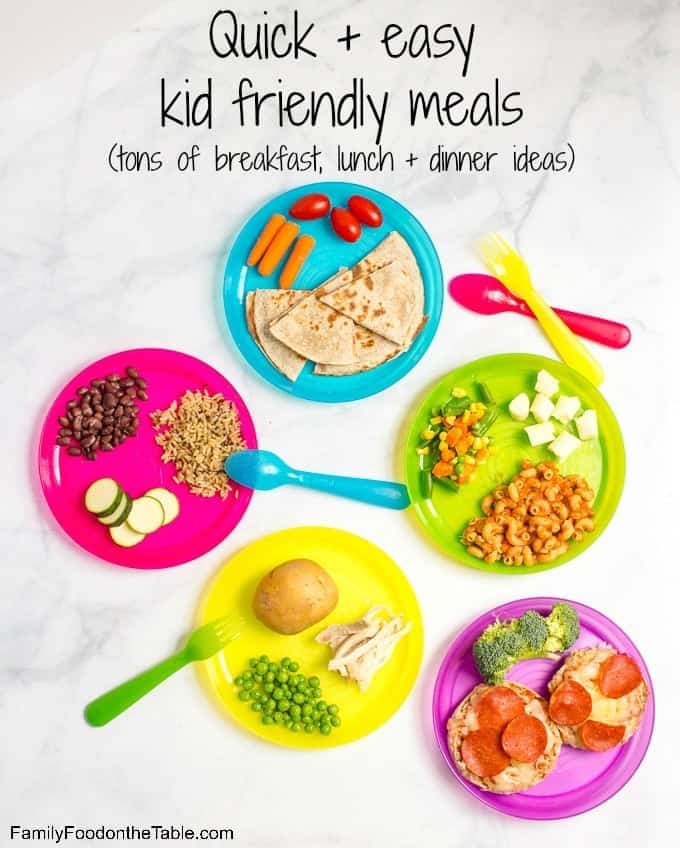“Healthy Meals for Kids: A Comprehensive Guide to Nourishing Your Little Ones
On this special occasion, we are delighted to explore the fascinating topic of Healthy Meals for Kids: A Comprehensive Guide to Nourishing Your Little Ones. Come along as we weave together engaging insights and offer a fresh perspective to our readers.
About Video Healthy Meals for Kids: A Comprehensive Guide to Nourishing Your Little Ones
Healthy Meals for Kids: A Comprehensive Guide to Nourishing Your Little Ones

Raising healthy and happy children is a top priority for every parent. A cornerstone of this journey is providing them with nutritious and balanced meals that fuel their growth, development, and overall well-being. However, navigating the world of children’s nutrition can be challenging, with picky eaters, busy schedules, and conflicting information. This comprehensive guide aims to simplify the process, offering practical advice, meal ideas, and strategies to ensure your kids get the nourishment they need.
Why Healthy Meals Matter for Kids
The importance of healthy meals for children cannot be overstated. Here’s why it’s crucial to prioritize nutrition from an early age:
-
Optimal Growth and Development: Children are in a constant state of growth, and their bodies require a steady supply of essential nutrients to build strong bones, develop their brains, and support their immune systems.
-
Cognitive Function: Nutrients like iron, zinc, and omega-3 fatty acids play a vital role in brain development and cognitive function. A well-nourished child is more likely to concentrate in school, learn effectively, and have better memory.
-
Energy Levels: Healthy meals provide sustained energy throughout the day, allowing children to participate in physical activities, play, and learn without feeling sluggish or tired.
-
Disease Prevention: A balanced diet rich in fruits, vegetables, and whole grains can reduce the risk of chronic diseases like obesity, type 2 diabetes, heart disease, and certain types of cancer later in life.

-
Healthy Habits: Establishing healthy eating habits early on can set the stage for a lifetime of good nutrition and a positive relationship with food.


Key Nutrients for Growing Kids
Understanding the essential nutrients that children need is the first step in creating healthy meals. Here’s a breakdown of the key players:
-
Protein: Essential for building and repairing tissues, protein is crucial for growth, muscle development, and immune function. Good sources include lean meats, poultry, fish, eggs, beans, lentils, tofu, and dairy products.
-
Carbohydrates: The body’s primary source of energy, carbohydrates should come from whole grains, fruits, and vegetables rather than refined sugars and processed foods.
-
Fats: Healthy fats, such as those found in avocados, nuts, seeds, and olive oil, are essential for brain development, hormone production, and absorption of fat-soluble vitamins.
-
Vitamins and Minerals: These micronutrients play a vital role in various bodily functions. Vitamin D for bone health, iron for blood production, and calcium for strong bones and teeth are particularly important for children.
-
Fiber: Fiber promotes healthy digestion, prevents constipation, and helps regulate blood sugar levels. Good sources include fruits, vegetables, whole grains, and legumes.
-
Water: Staying hydrated is essential for overall health. Encourage children to drink water throughout the day.
Strategies for Creating Healthy Meals
Creating healthy meals for kids doesn’t have to be a daunting task. Here are some practical strategies to make it easier:
-
Plan Ahead: Meal planning is key to success. Take some time each week to plan your meals and create a grocery list. This will help you avoid impulse purchases of unhealthy foods and ensure you have all the ingredients you need on hand.
-
Involve Your Kids: Get your children involved in the meal planning and preparation process. Let them choose recipes, help with grocery shopping, and assist with simple tasks like washing vegetables or stirring ingredients. This can make them more excited about trying new foods.
-
Make it Colorful: A plate filled with colorful fruits and vegetables is more appealing to children. Aim to include a variety of colors in each meal to ensure they are getting a wide range of nutrients.
-
Offer Variety: Introduce new foods gradually and repeatedly. It can take multiple exposures for a child to accept a new food. Don’t give up after the first try.
-
Be a Role Model: Children learn by example. If you eat healthy foods, they are more likely to do the same.
-
Limit Processed Foods: Processed foods are often high in sugar, salt, and unhealthy fats. Limit their intake and focus on whole, unprocessed foods.
-
Control Portion Sizes: Serve appropriate portion sizes for your child’s age and activity level. Avoid overfeeding.
-
Make it Fun: Use cookie cutters to create fun shapes, arrange food in creative ways, or serve meals in unusual containers.
-
Don’t Force It: Forcing a child to eat can create negative associations with food. Instead, offer a variety of healthy options and let them choose what they want to eat.
-
Be Patient: It takes time to develop healthy eating habits. Be patient and consistent, and celebrate small victories along the way.
Healthy Meal Ideas for Kids
Here are some meal ideas to get you started:
- Breakfast:
- Oatmeal with berries and nuts
- Whole-wheat toast with avocado and egg
- Yogurt parfait with granola and fruit
- Smoothie with spinach, banana, and almond milk
- Whole-grain pancakes with fruit and a drizzle of maple syrup
- Lunch:
- Whole-wheat sandwich with lean turkey, lettuce, and tomato
- Chicken salad with grapes and celery on whole-wheat crackers
- Quesadillas with cheese and black beans
- Leftovers from dinner
- Bento box with various healthy snacks like cheese cubes, fruit slices, and whole-grain crackers
- Dinner:
- Baked chicken with roasted vegetables
- Salmon with quinoa and steamed broccoli
- Lentil soup with whole-wheat bread
- Turkey meatballs with whole-wheat pasta and marinara sauce
- Homemade pizza with whole-wheat crust, vegetables, and low-fat cheese
- Snacks:
- Apple slices with peanut butter
- Baby carrots with hummus
- Yogurt tubes
- Trail mix with nuts, seeds, and dried fruit
- Popcorn (air-popped)
Dealing with Picky Eaters
Picky eating is a common challenge for parents. Here are some tips for dealing with picky eaters:
-
Don’t Give Up: Keep offering new foods, even if your child initially rejects them.
-
Make it Fun: Present food in creative ways to make it more appealing.
-
Offer Choices: Give your child some control over what they eat by offering a few healthy options.
-
Avoid Power Struggles: Don’t force your child to eat, as this can create negative associations with food.
-
Be a Role Model: Eat a variety of healthy foods yourself.
-
Sneak in Vegetables: Add vegetables to sauces, soups, and smoothies.
-
Get Them Involved: Let your child help with meal preparation.
-
Be Patient: It takes time to overcome picky eating.
Addressing Common Nutritional Concerns
-
Iron Deficiency: Iron is essential for healthy blood production. Ensure your child gets enough iron from foods like lean meats, beans, and fortified cereals.
-
Calcium Deficiency: Calcium is crucial for strong bones and teeth. Good sources include dairy products, leafy green vegetables, and fortified foods.
-
Vitamin D Deficiency: Vitamin D is important for bone health and immune function. Encourage outdoor play and consider vitamin D supplements if necessary.
-
Allergies and Intolerances: Be aware of common food allergies and intolerances, such as dairy, gluten, and nuts. Consult with a doctor or registered dietitian if you suspect your child has an allergy or intolerance.
The Importance of Family Meals
Eating together as a family has numerous benefits for children, including:
-
Improved Nutrition: Children who eat family meals tend to eat more fruits, vegetables, and whole grains.
-
Stronger Family Bonds: Family meals provide an opportunity to connect and communicate with each other.
-
Better Academic Performance: Children who eat family meals tend to have better grades and test scores.
-
Reduced Risk of Risky Behaviors: Family meals can help reduce the risk of substance abuse and other risky behaviors.
Consulting Professionals
If you have concerns about your child’s nutrition, consult with a pediatrician or registered dietitian. They can provide personalized advice and help you address any specific nutritional needs or challenges.
Conclusion
Nourishing your children with healthy meals is one of the best investments you can make in their future. By following the tips and strategies outlined in this guide, you can create a foundation for a lifetime of good health and well-being. Remember to be patient, consistent, and make it fun!

